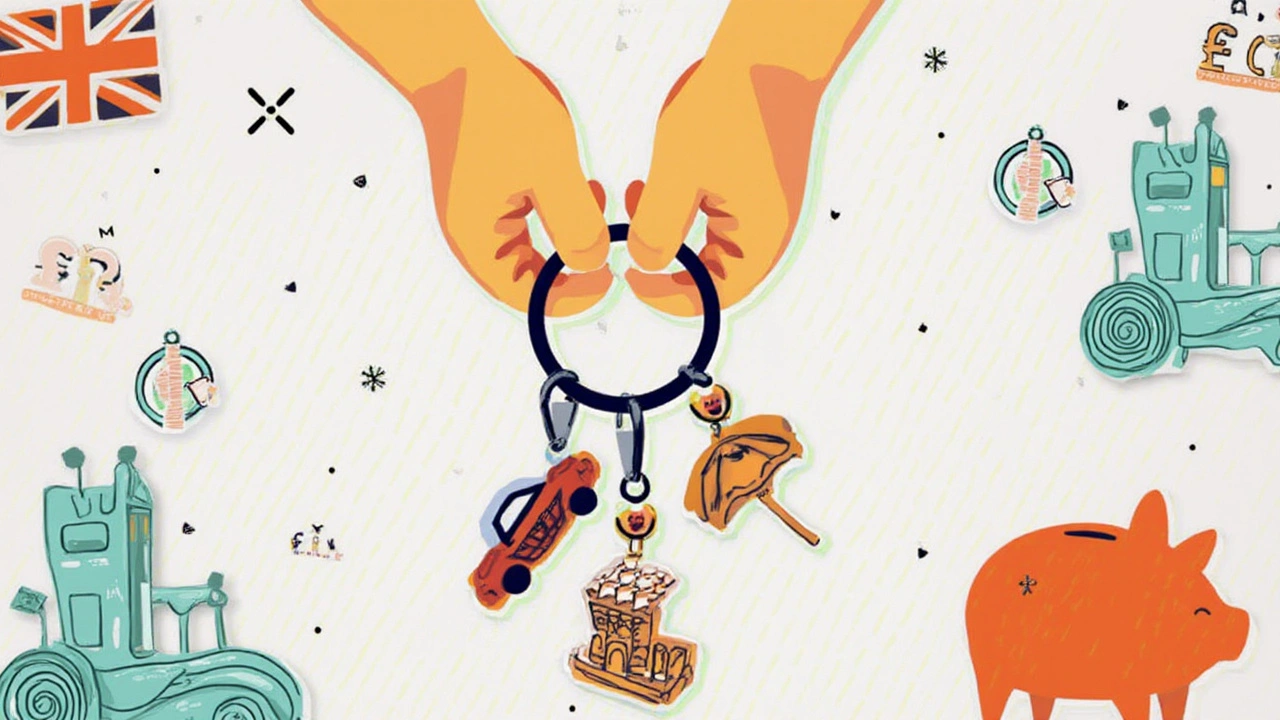Staring at another renewal letter with your jaw on the floor? You're not alone. It feels like insurance companies come for your wallet every year, and most folks in Dublin, like me, don’t know what to do but pay up. Yet, there are dozens of clever ways to lighten the load—some so simple you’ll wonder why you didn’t think of them sooner. Here’s the real secret: Insurers are keen on safe, organized, and savvy customers. If you know the right moves, you’ll have them dropping your premiums faster than you can say 'policy renewal.'
Understanding What Drives Insurance Premium Costs
First, let’s get real about why you’re probably overpaying. Insurance isn’t just about risk—it's about how much risk the company thinks you carry. Insurers use mountains of data to decide your price: From your address in Dublin to the engine size in your car, even details you wouldn’t expect, like a change in job or the colour of your front door, can shift your premium.
Your claim history is a big player. According to the Irish Insurance Federation, drivers with no claims save an average of 30-50% compared to those who have claimed in the past three years. Home insurance works the same way; just one small claim, say for a leaky roof, can nudge your premium up by 20% or more for years. Another fun fact: living near busy crossroads or flood zones sends warning bells to insurers. In Dublin, postcodes with higher theft rates (especially parts of D8 and D22) see 25% higher premiums on average compared to lower-risk areas, just because of the address.
Credit scores are starting to sneak into Irish insurance calculations too. The Irish Central Bank reported that, while not as influential as in the US, payment history can colour how ‘reliable’ you look. On the health side, age, lifestyle habits, and medical history are obvious factors—smokers pay about €500 extra per year on average for life insurance. The less risk you present, the more likely you are to reel in lower insurance costs.
It doesn’t stop there. Even your choice of car—or that new security alarm for your home—changes things overnight. I once swapped my old diesel estate car for a newer, smaller petrol car and, without warning, my quote for fully comprehensive cover dipped by €216 a year. These aren’t isolated cases; insurers update their data and pricing models every few months. That means what worked for your friend last year won’t always work for you today. The trick is knowing the current 'sweet spots' where you can make a difference.
Nothing makes me roll my eyes more than people just ‘letting it renew’ every year. Thirty-three per cent of Irish car insurance holders haven’t switched or even called for a quote in five years. Don't be that person. The teaser rates for new customers are usually much better than the loyalty penalty that creeps up on you over time. If you want specific numbers, a quick 2024 Ipsos survey found switching providers or negotiating with your insurer saves Irish drivers an average of €325 per policy. That’s a decent dinner for two at one of those fancy places in Temple Bar—and a lot more fun than giving it to your insurance company.

Best Practical Steps To Decrease Your Insurance Premiums
This is where things get way more interesting. Simple, no-nonsense moves can slash hundreds off your premium if you’re willing to put in a little effort. First, let’s get into the timing. Shopping around isn’t just a cliché; if you renew your policy at least three weeks before it expires, Irish insurers knock off up to 20%. It sounds mad but their data backs it: last-minute buyers get charged more. So, pull up your diary, set a reminder, and start digging for quotes early. It takes an hour, costs nothing, and you could pocket €200 or more.
Bundling is a gamechanger. Combine your car and home insurance with the same company and you’ll unlock a multi-policy discount. According to Aviva Ireland, the average bundled discount is about 15%. That’s huge for families juggling multiple policies. Be sure to compare—the discounts are sometimes less than the price difference between two separate best deals. Like, my pal Aoife swapped her car and home insurance to different unders, and even with ‘bundling,’ saved €180 by splitting them. You’ve got to run the numbers both ways.
No Claims Discounts (NCD) aren’t just a marketing gimmick. Guard that spotless record like a hawk! A clean NCD runs up to 70% off for car insurance and up to 40% on home cover. If you nudge a bollard but the cost is less than the premium hike from claiming, consider paying out of pocket. Some insurers even offer an NCD protection add-on, which keeps your discount even if you need to make a single claim every five years.
Raise your voluntary excess and the insurer will reward you. By agreeing to cover the first €500 of any claim instead of the standard €250, you can drop premiums by 8-15%. Just make sure you actually have that spare cash if something goes sideways. On the home side, sticking in simple home security—alarms, deadlocks, and cameras—takes a chunk off right away. Brokers.ie found that adding a monitored alarm can lop 20% off annual home premiums in many Dublin postcodes.
Now, about your car: Modest, lower-powered vehicles are always cheaper to insure. Those boy-racer upgrades? You’re basically paying double for a flashy spoiler and bigger exhaust. Cars with ‘low-risk’ reputations (think small hatchbacks) get you prompt discounts. Also, dashcams are a favourite now. They’re not mandatory, but insurers love them because it makes your claim hard to dispute—they might shave off 5-10% if you tell them you’re recording every trip.
If you’re happy to share your movements, telematics or 'black box' insurance is growing in Ireland—great especially for younger drivers. The black box tracks your driving habits, and good scores can lower your premium by 25% or more. A fact: Liberty Insurance says their careful telematics drivers pay an average of €320 less than those without.
Don’t forget about your job title—it can make a difference. For example, calling yourself a 'writer' rather than 'journalist' or a 'marketing consultant' instead of 'manager' sometimes shifts your risk category. Honesty is crucial—don’t stretch the truth—but try framing your role within the accepted lists when filling out insurance forms. It’s quirky, but it works. I once got quoted €100 less when I selected ‘office worker’ instead of ‘editor’, and I do both!
Curious how these little changes stack up? Here’s a real look from early 2025 at how premiums shift with tweaks:
| Action | Savings (Average, €) |
|---|---|
| Shop around 3 weeks early | €120 |
| Add monitored home alarm | €125 |
| Bundle car and home cover | €195 |
| Install dashcam | €85 |
| Increase voluntary excess | €60 |
| No claims discount (3+ years) | €220 |
| Switch from high-power car to standard hatchback | €210 |
Another fun tip: some health insurers will drop your premium if you sign up to wellness or gym-going programmes—Irish Life Health loves those step counters, for example. So if you’re already pounding the pavements by the Liffey, you might as well get paid for it, right?
But the queasy truth? Most people forget to update their insurer when circumstances change. Moved to a nicer area, got a promotion, installed flood barriers—each could lead to an instant drop. Just call up, be polite, and ask, "Is there any way I can lower my premium?" Many reps have flexibility or can point you to overlooked offers.
Insurance premiums are not set in stone; they’re a puzzle you can solve if you care enough to look at the details. Chat with a real broker as well as fiddling with comparison sites—some local brokers in Dublin know secret discounts for teachers, gardaí, or health workers that big online brands won’t shout about.

Hidden Traps, Discounts & Powerful Tips For 2025
Time for some insider secrets. Easter egg discounts are everywhere—companies won’t exactly advertise them, but if you know what to ask for, you’ll pay less than your neighbours. Start with the obvious: memberships. Unions, societies, or even your job might have arranged deals (think Garda Credit Union, INTO, or certain alumni groups). Ask your HR manager; Graham’s employer knocked nearly €350 off our family plan just by using a company scheme.
Loyalty, ironically, is rarely rewarded. Stick around too long and you become invisible. New customers reel in flash discounts (sometimes €200-400 off), while old ones slowly bleed cash. Every couple of years, either switch or at least call and threaten to do so—the ‘retention’ team usually finds a sudden, mysterious discount. The best day to haggle? Mid-week, mornings—call queues are short, and reps are less frazzled, more helpful. Don’t phone at 3pm Friday if you want a deal.
Insurance companies are zeroing in on your online accounts. Signing up for 'paperless' or digital policies gets you another €20-40 sliced off. Opt for monthly direct debit? You’re probably paying extra. Always try to pay annually, it saves about 8-10% on fees. And those auto-renewal traps—turn them off if you can. That ‘convenience’ is rarely free.
Another sneaky tip: If you barely drive, a low-mileage policy is straightforward. Irish insurers are compelled to offer lower rates for drivers under certain yearly mileage. Declare if your car sits idle for months, and you’ll see some instant savings. The pandemic proved this—average car premiums fell by 15% in 2020 among Dubliners driving less.
When you see a suspiciously low quote from a lesser-known brand, check the fine print. Rock-bottom deals often come with huge excesses, limited cover, or fees for small tweaks (like switching cars). Ask for the exact breakdown—if your quote is €200 below the rest, there’s probably a catch.
If your home is empty a lot (maybe you stay elsewhere, travel, or spend weekends away), flag it. Special 'unoccupied' policies can sometimes be paired with discounts if you take protective measures: timer lights, trusted neighbours, or video intercoms. Insurers love it when you actively manage risk.
Ever heard of 'occupation-based discounts'? Teachers, civil servants, healthcare workers, and certain government employees get preferred rates. My sister, a teacher in Clontarf, gets €150 less for car insurance just for ticking that box. It’s worth searching for a specialist provider if your job fits.
Right now, there’s a growing push for 'green' discounts. Drive a hybrid or electric car, or add solar panels to your roof, and you’ll join the environmentally friendly club. Zurich and Axa are leading this trend here. In 2025, hybrids and EVs attract up to 18% lower car insurance, and homes with solar solutions clock in at 10% less by average.
Now, a few quickfire tips before we wrap:
- Review your cover yearly. Don’t get stuck with out-of-date policies.
- Double-check optional extras—sometimes, you’re paying for add-ons like roadside rescue or gadget cover you never use.
- Young drivers? Adding an experienced driver (like a parent) as a named driver usually drops the average cost by €400+.
- If your car isn’t worth much anymore, consider dropping comprehensive for third-party, fire, and theft—a move that can halve some premiums.
- Ask if you qualify for special discounts: students, retirees, local community groups, or volunteers sometimes get favourable rates.
If your head’s spinning, you’re in good company. Even so, if you come at renewal with a sharp eye, ready to compare, haggle, and update your details, your insurer won’t stand a chance. They won’t hand you savings—so use these tips, get bold, and claim what’s yours.
